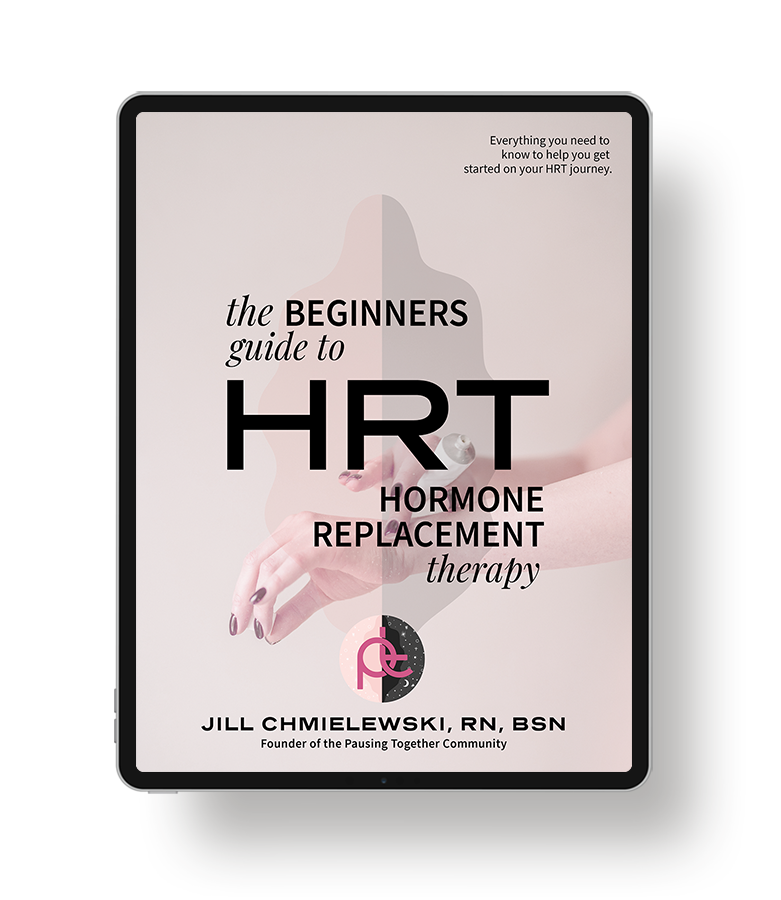Before I get into the nitty-gritty on the topic of hypothyroidism, I need to center myself with a VERY BIG deep breath. As a woman who suffered from hypothyroidism for many years before being diagnosed, this topic is very near and dear to my heart.
Of the estimated 60 million Americans (it’s estimated to be 200+ million worldwide) with thyroid problems, as many as half of them are undiagnosed and many that have been diagnosed are undertreated.

The vast majority of people who suffer from hypothyroidism are women ~ it’s actually 10 times more common in women than men. Hypothyroidism, or under-active thyroid, accounts for 90% of all thyroid imbalances. And 50-95% of chronic hypothyroidism is autoimmune in origin.
What’s even more upsetting than the statistics that I share here is the fact that in my experience as a women’s health nurse and coach, and as a woman who suffers from hypothyroidism, I can tell you that most women are astutely aware that something isn’t quite right in their body, have communicated their concerns to their doctor, and still aren’t properly tested for the disease.
So I want to arm you precious mommas with a little bit of functional know-how on the topic of thyroid function along with some testing information so that you can better advocate for yourself if you suspect that you suffer from hypothyroidism.
First, a little bit about your thyroid and how it works.
Your thyroid is a butterfly-shaped gland in the center of your neck. Think of it as your body’s thermostat ~ it is the master gland of metabolism and it’s function affects every single cell of your body. If your thyroid is sluggish, then you may feel sluggish from head to toe.
So, for example:
Sluggish thyroid = sluggish brain: You may suffer from brain fog.
Sluggish thyroid = sluggish liver: You may have detoxification issues or you may have elevated cholesterol.
Sluggish thyroid= sluggish digestion: You may suffer from constipation.
There’s are a whole slew of other organs that suffer too, but you get the idea ~ a sluggish thyroid means that your organs are going to be sluggish too. Make sense?
On to the thyroid hormones.
Thyroid hormone production is on a constant feedback loop. When your pituitary (in your brain) detects a drop in thyroid hormone, it makes more TSH (thyroid stimulating hormone) which tells your thyroid to produce more thyroid hormones.
Your thyroid produces a number of different thyroid hormones including T4, T3, T2, and T1, but T4 and T3 are the superstars of thyroid function.
Your thyroid primarily produces T4 thyroid hormone, along with a little bit of T3 thyroid hormone.
The problem with T4 thyroid hormone is that it is largely an inactive form of thyroid hormone, so it needs to be converted to T3, which is considered the most active form of thyroid hormone.
Certain raw materials are needed in order to successfully convert T4 inactive thyroid hormone to T3 active thyroid hormone, and those include iron, selenium, zinc and vitamin A. A shortage in any one of these nutrients and you’re not going to properly convert T4 to T3, leaving you with a sluggish thyroid.
To boot, the bulk of this thyroid hormone conversion takes place in your trusty liver (some thyroid hormone conversion occurs in the kidneys, brain, heart, and skeletal muscles too), so if you have a sluggish liver (due to a sluggish thyroid or from something else), it’s going to be pretty tough to carry out thyroid hormone conversion. Are you with me so far?
Now, there are many reasons that your thyroid may be sluggish and I won’t get into them today, but one of particular note is an autoimmune condition called Hashimoto’s (Grave’s Disease is the autoimmune condition associated with hyperthyroidism or an overly active thyroid). If you want a deep dive into all things Hashimoto’s, I might suggest that you check out Isabella Wentz, the Thyroid Pharmacist or Dr. Amy Meyers, a functional medicine physician who both specialize in autoimmune thyroid conditions.
So, how do you know if you have hypothyroidism?
Let’s start with symptoms. Symptoms vary from person to person, but the overarching theme is the feeling of sluggishness in the body. I can personally attest to this. I recall feeling cold all the time, being constipated all the time, having difficulty maintaining my weight, feeling low energy and having a slew of hormonal issues.
If you have any one of the following, or a combination, then you MAY have hypothyroidism:
- Feeling cold
- Brain fog
- Difficulty concentrating
- Brittle nails
- Gain weight (or difficult to lose) for no obvious reason
- Increased LDL cholesterol (I see this often in my clients)
- Fatigue/malaise
- Thinning eyebrows (especially the outer ⅓)
- Low energy
- Ongoing constipation
- Dry, course or itchy skin
- Rough PMS or rough perimenopausal symptoms
- Infertility and miscarriage
- Irregular menstrual flow
- Low blood pressure
- Low pulse
- Dry, coarse or thinning hair
- Depression/anxiety
- Low sex drive
- Muscle cramps
- Muscle loss
I find that physicians often dismiss women’s symptoms with skepticism, especially in my clients that complain of fatigue. They are told that fatigue is simply part of being a “busy mom” or being a “busy woman.” And the truth is that while modern day living is definitely the underlying cause for many of our thyroid-related issues, women are needlessly suffering because physicians are not listening to their patient’s symptoms, lack the training to properly test patients and lack the training to properly interpret a patient’s labs.
How to properly test for hypothyroidism.
In my opinion, this is where conventional medicine has really done a disservice to patients who complain of thyroid related symptoms. The bulk of conventional medicine physicians use one single blood lab marker to test for optimal levels of thyroid hormones: TSH.
TSH is NOT a good indicator of optimal thyroid function. (If you remember nothing else, please remember this). TSH is a brain hormone (not a thyroid hormone) that, when thyroid levels are low, travels to your thyroid via the blood and tells it to make more thyroid hormones. That’s it. That number alone doesn’t give us the status of T4 or T3 hormones in the body. We need to actually measure those levels in order to gain a better understanding of the body’s thyroid hormone status.
One thing to note about thyroid hormones (this applies to other hormones too): More than 99 percent of your thyroid hormones are bound to specific binding proteins found in the nucleus of the cells. Translation ~ If a thyroid hormone is bound to a protein, then it is unavailable for use in the body. So, when measuring thyroid hormones, it is actually more important to obtain levels of “free” (also known as unbound) hormones.
If this concept is difficult to understand, then try to imagine bound thyroid hormones as being part of a romantic couple. If two partners are in a romantic relationship (bound together) then, they are not available right? It’s the same concept with hormones. If a hormone is bound to a protein, then it is not available to the body. Hormones can only be used in the body if they are available and free. So getting lab data that shows us the amount of free thyroid hormone gives us a much better picture of thyroid hormone function in the body.
If you are experiencing any of the symptoms listed above and you suspect that you might have a thyroid issue, then get tested and be sure to ask for a full thyroid panel.
You can ask your physician for a full set of thyroid labs or you can order your own labs through a consumer lab testing site such as Blood Lab Testing Systems, My Med Lab, Ulta Labs or any number of others. The consumer lab testing companies typically do not accept insurance but do offer a discount for labs.
A full thyroid panel should include:
- TSH (Thyroid stimulating hormone)
- Free T4 or FT4
- Free T3 or FT3
- Reverse T3
- Thyroid antibodies – TPOAb and TgAb
What are optimal ranges for thyroid labs?
Once you have your results, you’ll want to interpret your labs using functional medicine ranges. I cannot emphasize this enough. The reference ranges that you receive with your lab results are not OPTIMAL RANGES, but rather provide an average of the lab results reported. Since most Americans feel pretty lousy, you don’t want to strive for lab ranges that fall within the average range. You want your body to function optimally, so strive for labs that fall within the optimal range.
- TSH – 0.5 – 2.0 uIU/mL
- Free T4 – 1.2 – 1.8 ng/dL
- Free T3 – 3.4 – 4.4 pg/mL
- Reverse T3 – < 15 ng/dL
- TPOAb – < 10 IU/mL or nonmeasurable
- TgAb – <20 IU/mL or nonmeasurable
What if my labs are outside of functional range?
If your levels fall outside of the functional ranges listed above and/or you have any measurable thyroid antibodies, then it’s time to take action. There are a number of different underlying reasons for thyroid hormone imbalances and working with a trained functional medicine practitioner who deeply understands the world of thyroid hormones is key.
Functional medicine practitioners are not a dime a dozen, so you’ll have to do a little bit of legwork to find the right practitioner for you. Isabella Wentz has a fantastic resource to help you find a like-minded FM practitioner in your area. To access the resource click here.
A final thought here before I go ~ There are instances when a patient may have thyroid symptoms, but thyroid levels are within the optimal range. For hormones to do their important work, they must bind to receptor sites on a cell. (Think of hormone receptor sites as docking stations on the cell. When the hormone “docks” into the docking station, it transmits its hormone message deep into the cell.) There are circumstances where a woman has adequate levels of thyroid hormones, but for one reason or another, the hormones simply won’t properly bind to a cell (or dock into the station). Currently, there is no way to measure this with a lab test. So, if you feel symptoms of hypothyroidism, but all of your thyroid lab markers come back within optimal range, it may still be best to make an appointment with a trusted functional medicine practitioner who will work with you to get to the root cause of your symptoms.





